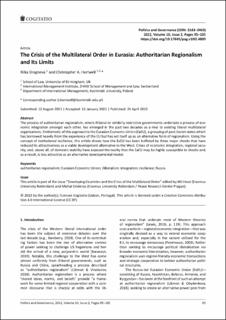Please use this identifier to cite or link to this item:
https://doi.org/10.21256/zhaw-25031Full metadata record
| DC Field | Value | Language |
|---|---|---|
| dc.contributor.author | Dragneva, Rilka | - |
| dc.contributor.author | Hartwell, Christopher A. | - |
| dc.date.accessioned | 2022-05-30T13:44:41Z | - |
| dc.date.available | 2022-05-30T13:44:41Z | - |
| dc.date.issued | 2022-04-21 | - |
| dc.identifier.issn | 2183-2463 | de_CH |
| dc.identifier.uri | https://digitalcollection.zhaw.ch/handle/11475/25031 | - |
| dc.description.abstract | The process of authoritarian regionalism, where illiberal or similarly restrictive governments undertake a process of economic integration amongst each other, has emerged in the past two decades as a rival to existing liberal multilateral organisations. Emblematic of this approach is the Eurasian Economic Union (EaEU), a grouping of post-Soviet states which has borrowed heavily from the experience of the EU but has set itself up as an alternative form of regionalism. Using the concept of institutional resilience, this article shows how the EaEU has been buffeted by three major shocks that have reduced its attractiveness as a viable development alternative to the West. Crises of economic integration, regional security, and, above all, of domestic stability have exposed the reality that the EaEU may be highly susceptible to shocks and, as a result, is less attractive as an alternative developmental model. | de_CH |
| dc.language.iso | en | de_CH |
| dc.publisher | Cogitatio | de_CH |
| dc.relation.ispartof | Politics and Governance | de_CH |
| dc.rights | http://creativecommons.org/licenses/by/4.0/ | de_CH |
| dc.subject | Authoritarian regionalism | de_CH |
| dc.subject | Eurasian Economic Union | de_CH |
| dc.subject | Illiberalism | de_CH |
| dc.subject | Integration | de_CH |
| dc.subject | Resilience | de_CH |
| dc.subject | Russia | de_CH |
| dc.subject.ddc | 320: Politik | de_CH |
| dc.title | The crisis of the multilateral order in Eurasia : authoritarian regionalism and its limits | de_CH |
| dc.type | Beitrag in wissenschaftlicher Zeitschrift | de_CH |
| dcterms.type | Text | de_CH |
| zhaw.departement | School of Management and Law | de_CH |
| zhaw.organisationalunit | International Management Institute (IMI) | de_CH |
| dc.identifier.doi | 10.17645/pag.v10i2.4809 | de_CH |
| dc.identifier.doi | 10.21256/zhaw-25031 | - |
| zhaw.funding.eu | No | de_CH |
| zhaw.issue | 2 | de_CH |
| zhaw.originated.zhaw | Yes | de_CH |
| zhaw.pages.end | 105 | de_CH |
| zhaw.pages.start | 95 | de_CH |
| zhaw.publication.status | publishedVersion | de_CH |
| zhaw.volume | 10 | de_CH |
| zhaw.publication.review | Peer review (Publikation) | de_CH |
| zhaw.author.additional | No | de_CH |
| zhaw.display.portrait | Yes | de_CH |
| zhaw.monitoring.costperiod | 2022 | de_CH |
| Appears in collections: | Publikationen School of Management and Law | |
Files in This Item:
| File | Description | Size | Format | |
|---|---|---|---|---|
| 2022_Dragneva-Hartwell_Multilateral-order-crisis-Eurasia-authoritarian-regionalism.pdf | 299.88 kB | Adobe PDF |  View/Open |
Show simple item record
Dragneva, R., & Hartwell, C. A. (2022). The crisis of the multilateral order in Eurasia : authoritarian regionalism and its limits. Politics and Governance, 10(2), 95–105. https://doi.org/10.17645/pag.v10i2.4809
Dragneva, R. and Hartwell, C.A. (2022) ‘The crisis of the multilateral order in Eurasia : authoritarian regionalism and its limits’, Politics and Governance, 10(2), pp. 95–105. Available at: https://doi.org/10.17645/pag.v10i2.4809.
R. Dragneva and C. A. Hartwell, “The crisis of the multilateral order in Eurasia : authoritarian regionalism and its limits,” Politics and Governance, vol. 10, no. 2, pp. 95–105, Apr. 2022, doi: 10.17645/pag.v10i2.4809.
DRAGNEVA, Rilka und Christopher A. HARTWELL, 2022. The crisis of the multilateral order in Eurasia : authoritarian regionalism and its limits. Politics and Governance. 21 April 2022. Bd. 10, Nr. 2, S. 95–105. DOI 10.17645/pag.v10i2.4809
Dragneva, Rilka, and Christopher A. Hartwell. 2022. “The Crisis of the Multilateral Order in Eurasia : Authoritarian Regionalism and Its Limits.” Politics and Governance 10 (2): 95–105. https://doi.org/10.17645/pag.v10i2.4809.
Dragneva, Rilka, and Christopher A. Hartwell. “The Crisis of the Multilateral Order in Eurasia : Authoritarian Regionalism and Its Limits.” Politics and Governance, vol. 10, no. 2, Apr. 2022, pp. 95–105, https://doi.org/10.17645/pag.v10i2.4809.
Items in DSpace are protected by copyright, with all rights reserved, unless otherwise indicated.